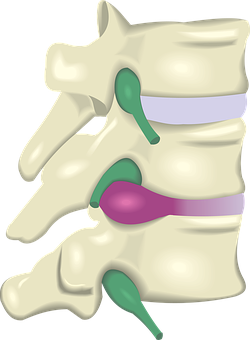How To Prevent Spine Damage
Since an early age, I have always been an avid sports enthusiast. It was this interest in sports over the years that directed me to my current interest in sports injuries and other related fields of musculoskeletal medicine. So many careers, amateur and professional, have ended with an unfortunate knock to the spine. But injuries don’t just happen on the field. Often, it’s the seemingly trivial things, like the way we sit, that can augment damage during impact. A knock to the spine can gravely affect a person’s quality of life. However, a knock to a strong spine is not going to cause as much damage as knock to a weak spine. I want to walk you through what spinal cord injury is, how it can happen, and some damage-prevention tips.
Put simply, spinal cord injury (SCI) is damage to the spinal cord. But damage to the spinal cord is an extremely serious physical trauma. This is due to the role the spine plays in the body’s function. We can think of the spinal cord as the body’s “courier system” – it is a series of nerves and other tissues that send messages to the brain. This “system” is protected by the vertebrae, the outer bones that are more commonly associated with the spine. If the spinal cord is injured, either the bones or the nerves, some of these impulses may not be able to reach the brain. This results in complete or total loss of sensation and mobility below the injury. If the injury is closer to the neck, there is a substantial risk of complete paralysis or lack of mobility.
I could (and won’t) sit here all day listing the assorted reasons people come to me with spinal cord injuries. But, I can quickly outline the more common: these include, motor vehicle accidents, bad falls, acts of violence, sports related injuries, alcohol, and diseases (such as osteoporosis and arthritis). Unfortunately, most of these are outside of our locus of control. I could recommend that you wear a seat-belt, that you don’t engage in violent behaviour, or abuse alcohol - but that wouldn’t be helpful, as you probably already know that. What I can offer here is some tips to help keep your spine strong, so, if you do encounter a grave knock to your spine – you will be in the best position to recover, and sustain as little damage as possible.
Again: a hard knock to a strong spine will cause significantly less damage than it would to a weak spine.
Top Tips On Maintaining A Healthy Spine
1) Exercising regularly is a fantastic way to keep your spine in great shape by helping maintain a stable weight, and helps reduce stiffness and tension in the spine. I recommend a mix of aerobic and anaerobic exercises. Importantly, when weight lifting you should maintain a balance between your chest and back, an overly strong chest on a weak back can cause serious back problems, and vice-versa.
2) Maintain a healthy weight. Being overweight puts excess strain on the spine and can weaken the spinal column which makes a heavy impact (like a car crash) even more dangerous. Fat accumulation in the abdomen is especially detrimental as it can cause bad posture. There is a strong association between the premature wear of the cartilage that protects your “courier system” and being obese. So, make sure you stay on top of your weight.
3) Eat healthily. These seems obvious from the last two points, but eating healthily not only helps maintain a stable weight, but also gives the body the nutrition it needs to help the spine do the job it needs. Vitamin D (which you can get from the sun) and calcium (which you can get from milk) are two key nutrients that help conserve bone strength and density.
4) Improve your posture. A good posture, both walking and when resting, is a great preventative step to lessen stress on the spine. It facilitates weight distribution and keeps the vertebrae and discs in the correct position.
5) Stretch. I especially direct this one to those of you who are in front of a computer screen all day. When at work, take time to stretch out your body every half hour to an hour. Even if you have great posture, staying the same position for extended periods of time usually causes tension and stress on the spine.
As I explained, SCI can occur from a vast quantity factors and there is only so much we can do in preventing damage to the spinal cord. We can’t prevent things outside of our locus of control, but we can ensure that if something does happen, we are in the best situation to combat it.
Maintaining a strong spine is the best preventative step to avoid SCI. Maintaining a strong spine could be the deciding factor between a life changing accident, or manageable spine damage. Sports are a fantastic way of maintaining a healthy spine - a game of tennis or a quick gym session before work can do miles for helping your spine stay strong and healthy.



